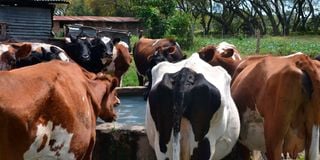Why bulls are not wanted in Kiambu

Dairy cows at homesteads in Kiambu County. The County government is helping smallholder dairy farmers access sexed semen at a subsidised cost to increase probability of heifer production.
Bulls are symbols of status in many counties. In Kiambu, however, they are considered interlopers and a burden. Farmers even spend huge amounts of money to get special semen that ensures their cows only deliver heifers. The county produces a million litres of milk daily as a result.
With a phone-based chatbot known as AgriBot, smallholder farmers can get to Village-Based Advisers (VBAs) whenever their animals show signs of heat. The VBAs are then able to link the farmer with the nearest artificial insemination (AI) service providers who have convectional and sexed semen.
“We developed several models, including training of elite community members (VBAs). We introduced digital technology to ease the burden of extension services and are supporting growth of cooperatives to ensure farmers have access to a structured market, finance and sufficient feeds,” said Joseph Kamau, the Kiambu Agriculture executive.
To sustain milk production, the devolved government provides free AI services for conventional semen and sexed semen at 50 per cent subsidised fee.
The sexed semen guarantees 99 per cent chance of a female calf.
Conventional semen is raw semen as extracted from the bull for AI. The probability of a cow producing a male or female calf with conventional semen is 50/50.
Sexed or sex-sorted semen is different. The chromosomes in the sperm cells are either killed or removed through sorting. This leaves the semen with only “Y” chromosomes, which leads to very high chances of a female calf.
According to a study by Cambridge University, male calves increase the risk of dystocia (difficult or obstructed labour) compared with heifer calves. The economic value of males is also low.
“The free semen service programme has been running for two years. Those farmers interested in sexed semen pay Sh2,500, with the remaining Sh2,500 being settled by the devolved government,” Kamau says.
According to Mercy Nyokabi, a dairy farmer in Kiganjo, Gatundu South constituency, there is no point of risking with conventional semen even if the service is free.
“I’d rather spend the Sh2,500 and be assured of a heifer,” she says.
The VBAs are society members trained to ensure locals adhere to best farming practices.
Every VBA is linked to distributors of farm inputs, animal feed, chemicals and equipment.
VBAs have direct contact with county government agriculture officers. They conduct demonstrations in their homes with support from input distributors.
Fellow farmers and villagers come over to learn.
The distributors supply the VBAs with the inputs at wholesale price on credit.
These VBAs can then sell the inputs to villagers for a small profit during the demonstrations or on demand.
Nyokabi is one of the VBAs in Gatundu South.
“If any farmer needs artificial insemination services for example, or if their animals are sick, or if they have observed something strange in the livestock, they simply call me,” she says.
“I then contact county government livestock officials for quick intervention.”
Kiambu County has 2,600 VBAs, with each working directly with 200 to 300 farmers from their neighbourhood.
The farmers communicate through the AgriBot – the app that provides all agricultural information for specific areas.
Through the app, the farmers can ask questions or send pictures of whatever they have observed for the attention of county government experts.
“This model has helped us simplify the problem of extension services, a big challenge facing Kiambu farmers,” Kamau said, adding that with the current situation, one extension officer is expected to serve around 3,000 farmers.





